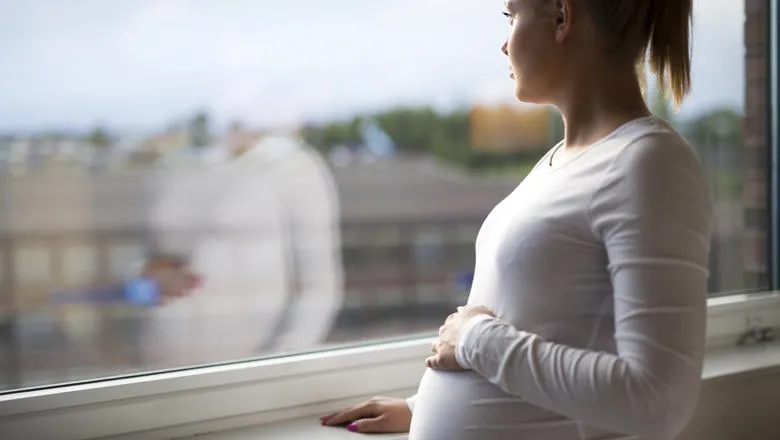Mental health may affect parental reproductive biology and antenatal pathways and can have an impact on genetic and environmental influences such as substance use and nutrition, which could be linked to a baby’s development.
Dr Claire Wilson, MRC Clinical Research Training Fellow, Institute of Psychiatry, Psychology & Neuroscience (IoPPN), King's College London
12 October 2020
Prospective parents' mental health associated with premature births
New research from King’s College London finds an association between the mental health of prospective parents and the likelihood of premature births.

The research, co-led by King’s College London’s Institute of Psychiatry, Psychology & Neuroscience and the Murdoch Children’s Research Institute (MCRI), found men with persistent mental health problems through adolescence and young adulthood were more likely to have a baby born premature. Women with anxiety and depression during pregnancy were more likely to have a preterm birth. The study was published in the journal EClinicalMedicine.
The authors said that prior to this study the impact of maternal and paternal mental health history on offspring preterm birth and birth weight was uncertain.
The study involved 398 women and 267 men from the Victorian Intergenerational Health Cohort Study (VIHCS) in Australia, who were assessed over 15 years for anxiety and depressive symptoms from adolescence to young adulthood and during subsequent pregnancies. These findings are observational and a causal relationship cannot be proven.
Study co-lead, King’s College London’s Dr Claire Wilson, said understanding how mental health problems starting in adolescence affect birth outcomes could open up new opportunities for the prevention of premature birth.
She added ‘Early and mid-late preterm birth can carry lifelong effects on health and development such as visual and hearing impairments and poor health and growth. Indeed, pre-term birth is common and is a significant cause of infant deaths worldwide, but the underlying causes have been largely unknown.’
Study co-lead MCRI’S and Deakin University’s Elizabeth Spry said that fathers were often neglected in research on children’s early growth and development.
‘We found that men with persistent mental health symptoms in the decades leading up to pregnancy were more likely to have premature babies. Our study joins growing evidence of the important role that fathers play in the health and development of their children, and suggests that these links begin well before babies are conceived,’ she said.
‘Most research on children’s early development has focused on mums. This means that public health recommendations are also almost entirely focused on what mums should and shouldn’t do when planning pregnancy or having a child. In contrast, men receive very little guidance or support.’
MCRI's Professor George Patton said the findings further strengthened the need for expanding preconception mental health care to both men and women, prior to them becoming parents.
The findings emphasise a need for coordinated care between child and adolescent, adult and specialist perinatal health services.
Professor George Patton, Murdoch Children's Research Institute (MCRI)
He continued, ‘Intervention in adolescence is likely to yield benefits not only for parents’ own continuing mental health, but also for their child’s development, both by reducing the risk of premature birth and promoting positive engagement and nurturing care across the early years of life.’
Claire Wilson also highlighted the impact of the COVID-19 pandemic and subsequent lockdowns on the mental health of prospective parents, which may have future implications for when they have children.
She said ‘Given the increase in rates of anxiety and depression in adolescents and young people, research tracking the health and wellbeing of young parents through their pregnancies is needed now more than ever. Our findings also emphasise the importance of optimising mental health prior to pregnancy, and so we strongly encourage young people experiencing poor mental health during the pandemic to seek support and help.’
Researchers from Deakin University, South London and Maudsley NHS Foundation Trust, University of Melbourne, Royal Women’s Hospital, Florey Institute of Neuroscience and Mental Health and the University of Bristol also contributed to the parental study findings.
Parental mental health before and during pregnancy and offspring birth outcomes: a 20-year preconception cohort of maternal and paternal exposure,’ Elizabeth Spry*, Claire A Wilson*, Melissa Middleton, Margarita Moreno-Betancur, Lex W Doyle, Louise M Howard, Anthony J Hannan, Mary E Wlodek, Jeanie LY Cheong, Lindsey A Hines, Carolyn Coffey, Stephanie Brown, Craig A Olsson and George C Patton. *joint first authors DOI: 10.1016/j.eclinm.2020.100564 is published in EClinicalMedicine
Contact
For further information please contact Alice Kay, Interim Senior Press Officer at alice.kay@kcl.ac.uk / +44 7718 697176

